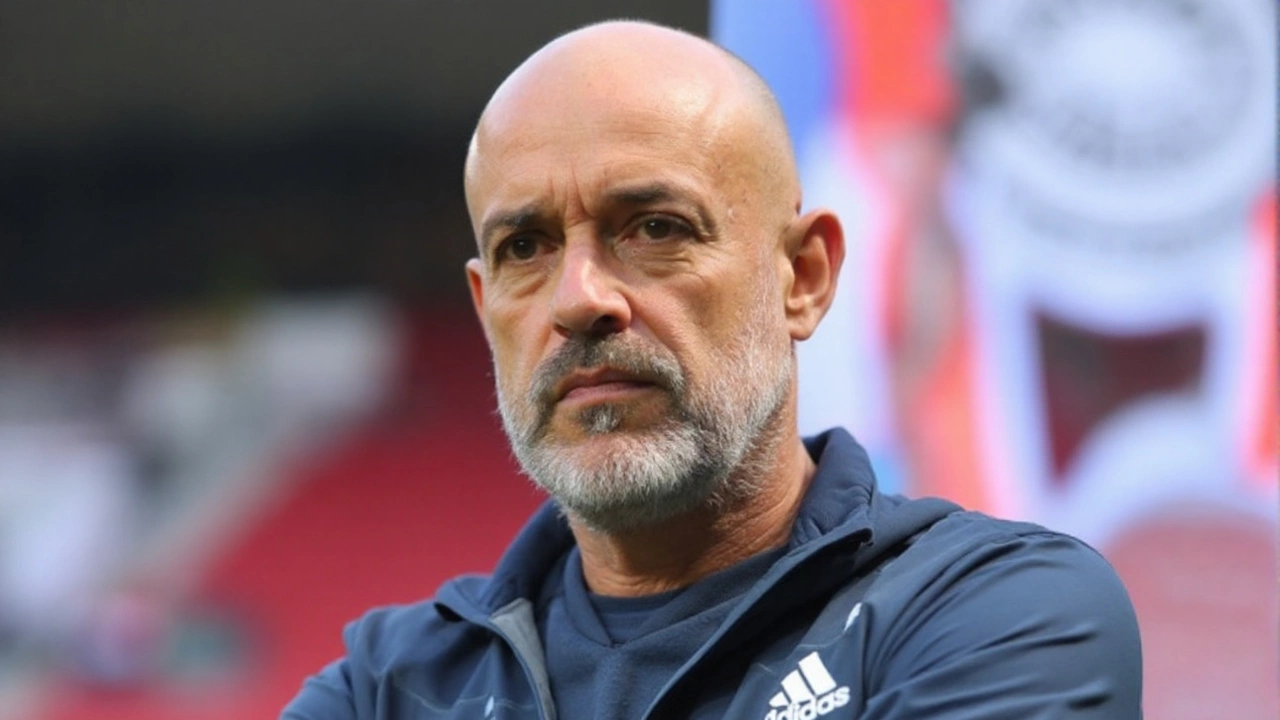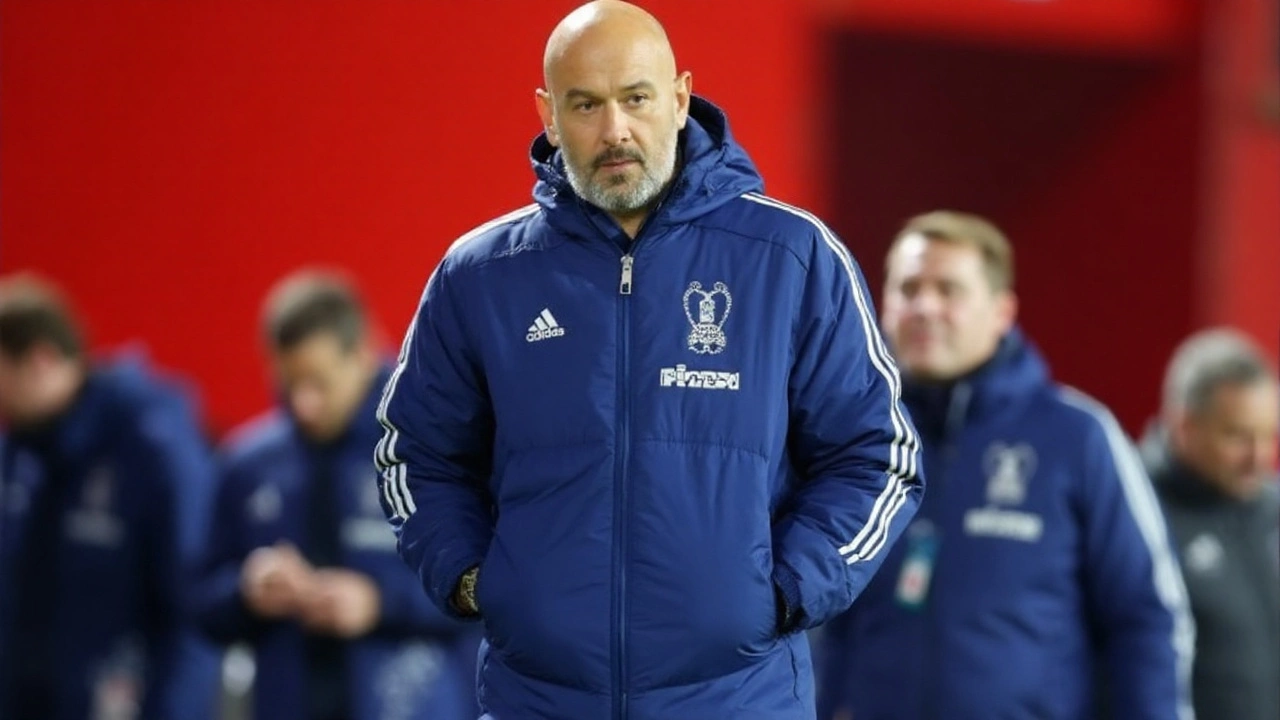Three games in, Forest pull the plug
Three league matches. That’s all it took for Nottingham Forest to pull the trigger on Nuno Espirito Santo’s job, only weeks after handing him a new three-year deal. It ends a run that looked, for a time, like a fairytale. Nuno arrived in December 2023, steadied a wobbling side, and then led Forest to seventh place in 2024/25 — the club’s first European qualification in three decades. The club confirmed his dismissal on Monday, thanking him for what they called a “very successful era.”
The shock isn’t about results. It’s about relationships. Nuno’s bond with owner Evangelos Marinakis, once close and constant, had frayed badly by the end of the summer window. Nuno spoke about it openly, saying he and the owner were no longer aligned, that they weren’t speaking as often, and that “where there’s smoke, there’s fire.” For a manager who had just delivered European football, the timing feels brutal. For those inside English football, it feels very Marinakis: decisive, impatient, and uncompromising when he thinks the project is drifting from his control.
Forest’s rise under Nuno was rapid. The club survived relegation fears in his first half-season, then surged the next year with a clearer plan and sharper performances. That seventh-place finish led to Europa League football, upgraded from the Conference League after Crystal Palace were bumped down under UEFA’s multi-club ownership rules. It was a rare break that Forest seized — continental nights returning to the City Ground at last.
But while the story looked smooth on the surface, the summer told a different tale. Nuno wanted a more possession-heavy style and asked for earlier signings so pre-season could be used to shape the team. Instead, deals dragged. Forest still recruited heavily — 13 new faces for a reported £196 million in initial fees — but the pace upset the plan. Several exits, including Anthony Elanga, Danilo, and Wayne Hennessey, added to the churn. After two years of big squad turnover, Nuno felt this window needed smarter timing, not just more names.
The tension didn’t sit with one person, but a flashpoint emerged around the club’s new head of global football, Edu. Nuno’s camp felt the football department slowed decision-making and added extra layers to an already complex structure. People close to the process say targets moved, priorities changed, and the manager felt his authority chipped away. Nuno didn’t hide that frustration. That honesty, admired by some, clearly rattled the hierarchy.
The club’s official statement praised him and the memories of 2024/25, but it didn’t fight the whispers: this was a political sacking as much as a sporting one. If the owner-manager axis is broken, Forest acts fast. They have before. They will again.
And yet there’s a football cost. Nuno’s shift toward a more controlled style was a big swing from the ambitious, transition-heavy football that had kept Forest alive the year before. He wanted more of the ball, a calmer team in possession, and a unit that could cope with Thursday-Sunday demands in Europe. The pre-season he called “wasted” now becomes someone else’s starting point, with key signings learning a new plan under a new voice.

Why it happened and what comes next
You can point to a few factors that made this blow-up almost inevitable. First, the governance. Forest’s ownership is hands-on, and Marinakis has a long record — both in Nottingham and at Olympiacos — of changing course quickly when trust dips. Second, the process. Football departments exist to balance scouting, finances, and long-term planning, but when they slow decisions, managers feel it hard. Third, the calendar. With UEFA registration deadlines and an early international break, the window’s final weeks were always going to be tense. Fourth, the ambition. European football brings opportunity and stress. The margin for internal disagreement shrinks when you’re trying to build two teams in one.
Here’s the picture now:
- Forest need a head coach before their trip to Arsenal on September 13. If not, an interim from the current staff likely takes the team at the Emirates.
- Europa League group fixtures start soon after. Squad lists for Europe are set early this month, which puts pressure on clarity and continuity.
- The new coach inherits a large, expensive squad that has been built across multiple windows with different ideas in mind.
- Supporters will look for signs the club can keep momentum without losing identity — the old fear when a successful manager walks.
Names will be thrown around. Expect the usual suspects: coaches comfortable working inside strong executive structures, tacticians with European experience, and candidates who won’t demand sweeping control of recruitment. Forest may also test the waters for managers currently in jobs if they see a long-term fit. There’s also a simpler route: give the current staff a short run while sounding out targets quietly. That buys time but risks a bumpy restart.
There’s a broader backdrop, too. The Premier League’s financial rules have shaped transfer strategies across mid-table clubs, and Forest have operated right on the edge since promotion. Heavy spending brings depth but also risk. Integrating 13 signings in one window is hard for any coach, never mind one also changing style. When results are neutral and relationships sour, the manager almost always loses the argument.
As for Nuno, his stock hasn’t crashed. He delivered Europe to a club that hadn’t seen it in 30 years, and his Wolves team from an earlier era is still admired for its organization and edge. He’ll be linked with jobs quickly, at home and abroad. He’s always cut a calm figure on the touchline, and he exits Forest with credit for stabilizing a volatile situation — even if he couldn’t steady the politics.
UEFA’s multi-club ownership rules added an unusual twist to this summer. Forest’s step up into the Europa League came after Palace were moved down the ladder. The rule is simple: two clubs effectively controlled by the same ownership group can’t both compete in the same UEFA competition tier in the same season. The knock-on effects can be dramatic, and Forest were a beneficiary this time. That extra spotlight only raises the stakes for whoever takes the job next.
The dressing room now needs clarity. Players who signed for Nuno did so to play a certain way. That doesn’t vanish overnight, but tweaks will come fast. Expect the next coach to simplify first: tighten the back line, settle on a core XI, and lean on set pieces while the group gets to know each other. The Europa League demands rotation, but identity matters. Forest found that out the hard way last year when balance made all the difference down the stretch.
Forest’s communication will be watched closely in the coming days. Supporters understand ambition; they also crave stability. A clear appointment process, a short list that makes football sense, and early words about style and standards would steady nerves. The schedule won’t wait: Arsenal away is a blunt test, and the European opener lands right after. Start slow, and the narrative turns quickly from bold to brittle.
If you zoom out, this is the Premier League in 2025: power centralized at the top of clubs, huge turnover in the market, and little patience when alignment slips. Forest are a case study. They’ve spent big, chased upside, and hired managers with profiles to match. It worked, until the internal chemistry didn’t. The irony? They now need the very thing Nuno was asking for — a joined-up plan across the football department, the owner’s office, and the training ground.
Key moments in the Nuno era at Forest paint the arc:
- December 2023: Appointed with Forest hovering near the bottom three, tasked with stabilizing a restless squad.
- Spring 2024: Survival secured, performances trending up, mood soothed around the training ground.
- May 2025: Seventh-place finish locks in European football for the first time since the mid-1990s.
- June 2025: New three-year contract signed amid optimism and talk of a style reset.
- August–September 2025: Transfer friction, public hints of tension, and a dismissal three matches into the league campaign.
Football moves fast. Forest must move faster now — not just to fill a seat, but to reset a relationship between the pitch and the boardroom. Their European return is a gift and a test. Get the next call right, and this week becomes a blip in a bigger rise. Get it wrong, and a season that promised nights to remember could turn into a long, messy slog.
